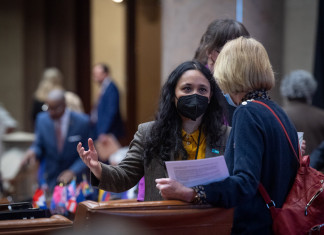By Dr. Julianne Porter
Rhinebeck Animal Hospital
The Holiday Season can be a happy time for us humans and our four-legged family members, but it is important to remember there are hazards in the holidays for pets.
As with any big event, food is usually a main component. While it may feel nice to share your meal with Fido or Fluffy, remember that table foods can lead to serious illness including: vomiting, diarrhea, pancreatitis, obstruction and toxicities. Bones can splinter and puncture through the stomach or intestines, causing serious pain, infection and death if not treated. Chocolates and other candies can cause serious health issues as well. Onions and garlic not only cause an upset stomach but can lead to anemia (a condition where the red blood cells are dangerously low). A small amount of cooked meat is okay as long as it is not attached to the bone or heavily seasoned.
And be sure to hide those holiday snacks where your pets cannot reach them.
Plants such as poinsettias, mistletoe and lilies are common around the holidays. While poinsettias and mistletoe will likely only irritate your pet’s gastrointestinal system, lilies can be deadly. If ingested, lilies can lead to irreversible kidney failure, especially in cats. Be sure to keep any holiday bouquet away from your pets and remember that even they ingest a small amount, it can be enough to cause toxicity. Visit the ASPCA at http://www.aspcapro.org/ for more information on the problems of plants.
Another big part of many holiday traditions are the decorations. Ornaments are shiny and attractive, which can lead to broken fragments, which can cause cuts on paws and mouths or even intestinal trauma and obstruction if swallowed. Don’t forget tinsel and ribbon can be highly enticing to cats, but if ingested, can lead to obstruction that needs surgical intervention.
The best ways to prevent these hazards is to supervise your pets around the decorations and tree, pick up any fallen ornaments and do not leave unused hooks, ribbons or ornaments lying around. It may be best to not have any hanging ornaments on the low branches and if your cat is one who likes to scale the tree to its highest top, you may want to consider securing the tree to the wall.
Lastly, let’s not forget travel as part of many holidays. Living in an area with snow means that our sidewalks and streets may be covered with salt and chemical snow melts. These substances are extremely irritating to bare paws and if licked off, can cause gastrointestinal upset. Avoid having your pet walk on these areas, or be sure to wash their feet as soon as they come inside.
Whether you are traveling or hosting travelers at your house, your otherwise happy pet may become stressed. Kenneling your pets during this time might be a good idea so they do not injure themselves, damage any decorations or get into any foods or treats. Anti-anxiety medication can be used as well if needed.
If you find yourself dealing with one of the above hazards, call your veterinarian. Many of these problems can become much worse if not dealt with immediately. Also, be sure to have the information (phone number and directions) of the local emergency center readily on hand. The holidays can be both exciting and stressful, and the last thing you want to be doing is worrying about your pets’ health.
Please refer to our website for more information and resources: www.rhinebeckanimalhospital.com, then click current news under the articles and news heading.
Wishing you all a safe and happy Holiday Season and a Happy New Year.







Facebook Comments